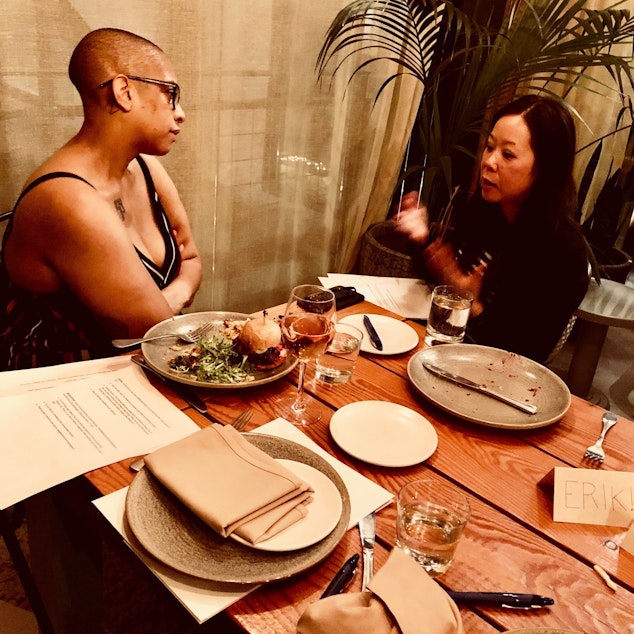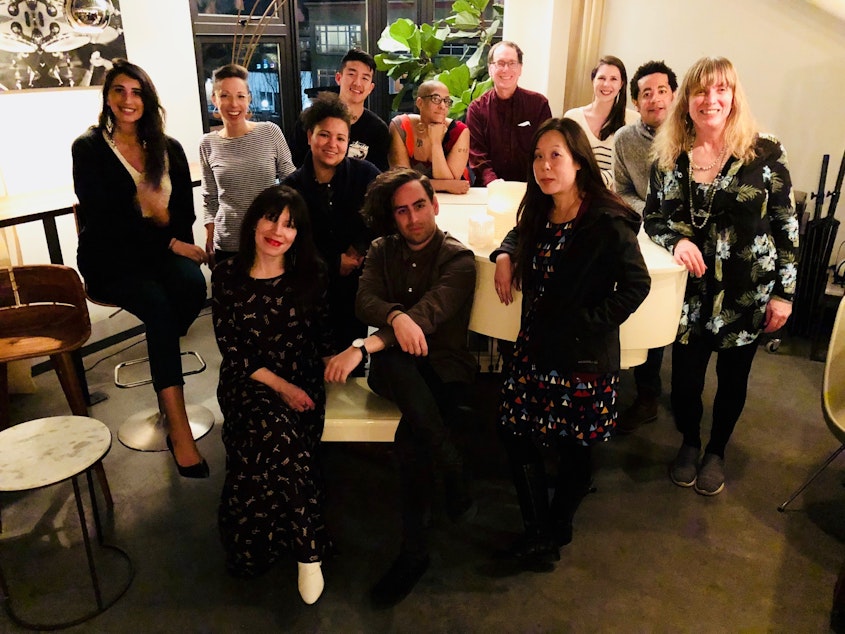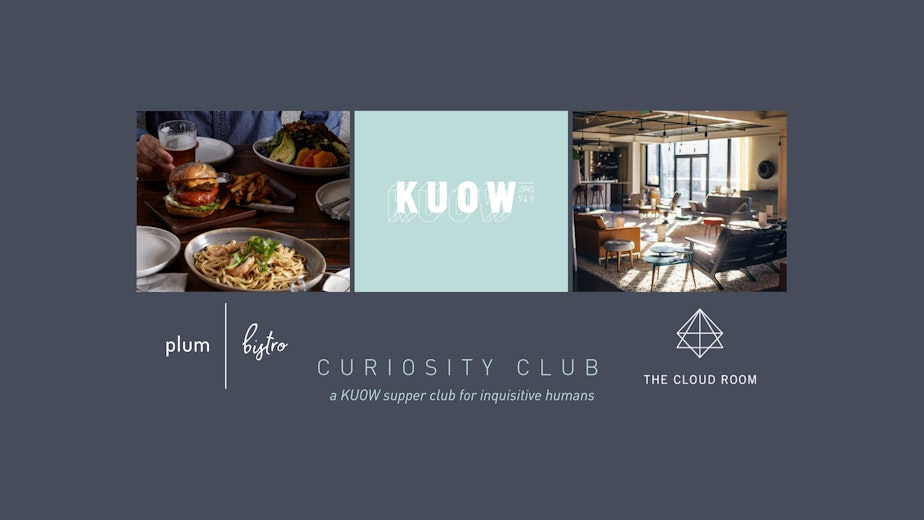Facing imposter syndrome at a Curiosity Club dinner
Introverted artist Shin Yu Pai joined KUOW for a three-month experiment in thawing the Seattle Freeze. Here's what happened when the conversation turned to race.
I didn’t know what I’d be embracing when I signed up for Curiosity Club. Was it a focus group? An act of community building? An ongoing experience with uncommon conversations?
When I teach poetry workshops, I sometimes use a photograph, a line from a poem, or an image of artwork to get people thinking on the page or talking about their lived experiences.
The Curiosity Club’s approach of using curated radio stories to open up the mind felt very much in this same spirit — to provoke a different kind of encounter than the everyday through focusing on the human experience that exists both outside and within the self.
I’d loved my work with community engagement producer Kristin Leong during our days doing programming with Town Hall Seattle and filled out the application for the Curiosity Club. I was both excited and apprehensive to be accepted.
An Introvert's Risk
Sponsored
I’m known in my small circle of friends for being painfully shy under certain circumstances. My poetic mind likes to take the back seat, observing the action, collecting experience and attuning to conversations that I’ll later sift through in the sense-making process that becomes poem writing. This is the epitome of safety to me, to be in the room but to engage on my own introverted terms.
To sign up for a supper club is a very different commitment — one that invites a certain level of dialogue and generosity of self, to step out of a comfort zone and risk feelings of impostor syndrome.
I wrestle with the complicated nature of stepping forward into being my whole person. Being fully seen can be both liberating and painful. It’s easy to default to hiding away both the best and worst parts of the self by living up to the stereotype of being an Asian woman — to make oneself smaller, and therefore safer.

A Curious First Encounter
The process of thinking out loud in the effort to connect with others can be disarming.
I think back to one of my first Curiosity Club conversations with Sharlese Metcalf. I was gazing at the series of Chinese characters inked into her left bicep, when she looked me in the eye and asked me if I found the tattoo offensive or appropriative.
I was taken aback: No one has ever asked my opinion so directly and with such genuine care for my response. I was completely unprepared for this kind of candor, and as a result, I felt an instantaneous and authentic sense of connection with Sharlese, because I understood that our conversation would occupy an experience beyond anything transactional.
Bringing Race and Identity to the Table
At our third and final dinner gathering, our group discussed Adwoa Gyimah-Brempong’s story, "Performing blackness in white spaces — including on public radio." In the piece, Imani Sims and Carvell Wallace engage in a complicated conversation about their racialized bodies and experiences.
Sponsored
Club member Mellina White Cusack and KUOW facilitator Kristin Leong both remarked on their perspectives as biracial individuals and where they could and couldn’t see themselves in that conversation.

Responding to Marceline Flynn’s story "I didn't know my mom was non-binary until I started to question my gender identity," club member Jenny Hegeman talked about seeing people as individuals beyond race and gender.
As appreciation, disagreement and occasional dissent expressed themselves around the table, I realized what I have valued most in my Curiosity Club cohort is the space that we held for one another.
I never felt obligated to perform being an Asian American woman at our dinners; my history, my commitments, my obsessions. It was this spaciousness that allowed me to talk openly about my thoughts on Megan Farmer’s story "Life after a hate crime: the recovery of DaShawn Horne."
Sponsored
When the horrific news of DaShawn Horne’s brutal beating broke in 2018, I found myself unable to turn away. Horne was assaulted by a young Polynesian man who was enraged that his sister brought home an African American man. The incident was reported as a hate crime.
Lost in the narrative was a larger discussion of the complexities of the event. No one thought Horne would survive the beating.
I wished that Farmer’s story gave more space to the circumstances and details of his attacker. I couldn’t make sense of whether the motivation was racism, internalized anti-blackness, self-loathing, or the toxic masculinity of defending a woman’s honor.
I have likewise felt held captive by news stories about Asians in the media like Seung-Hui Cho or Elliot Rodger, other perpetrators of violent crimes.
For me, these stories connected back to Farmer’s story in that the perpetrator of the violent crime committed was an individual of Asian descent.
There has been a historically narrow lens that the media has used to look at Asians and Asian Americans. Themes of mental illness, delinquency, anti-blackness, and misogyny run counter to media narratives about model minorities. In this way, the complexities of Asian American experience are often oversimplified to package more convenient narratives about hate crimes.
Farmer’s story left me feeling confused about how to talk about violent crime when it is perpetuated by people of color upon people of color.
It reminded me of sitting years ago in an anti-racism workshop facilitated by an academic who focuses on whiteness and hearing her say that people of color cannot oppress other people of color because they lack power and do not control the larger systems of oppression. This seemed fundamentally untrue to me, because we can all do harm.
Lessons from Curiosity Club
At each of our three dinners I arrived with far more feelings and questions than opinions, but something Curiosity Club offered to me was the ability to explore and express my convoluted opinions while they are in a state of emerging.
My mind is messy and to harness and articulate a thought in the moment is akin to the warrior exams administered in a Buddhist college.
Now that the experiment is over, I think about what it would feel like to engage with strangers in this kind of intimate and vulnerable conversation on a daily basis. How would we feel filled up, or seen, or valued? How could this way of engaging disarm or undo harm? Sometimes we need the invitation of a third object to open up that kind of way of being together, but the larger learning comes back to simply being, listening.

Shin Yu Pai is a poet, essayist, and visual artist. She served as an Inside/Out artist-in-residence for Town Hall Seattle, is a former ambassador of On The Boards, and served as the fourth Poet Laureate of the city of Redmond from 2015 to 2017. She currently works as a full-time events producer for Atlas Obscura, designing public programs and experiential events that take place throughout the Pacific Northwest. Ensō, a twenty-year survey of her work as a visual artist and poet, will be published in Fall 2019 from Entre Rios Books. She is curious about neuroscience, chemistry, food, faith, and creativity.
Read Curiosity Club member Mellina White Cusack's take on the Club's second dinner here: She’s a queer, conservative, ex-Jehovah’s Witness. When she comes to dinner, controversy sparks
Read Curiosity Club Pop-Up participant Ishea Brown's reflection on the Club's first one-off dinner here: Are we living in a post-racial society? Ishea Brown of Curiosity Club says no

Thank you to The Cloud Room and Plum Bistro, our KUOW Curiosity Club partners.
The Cloud Room is a stylish co-working community and bar that’s enriched by the people who occupy it.
Plum Bistro is serving the best in plant-based comfort food made with local, sustainable, and organic ingredients.



